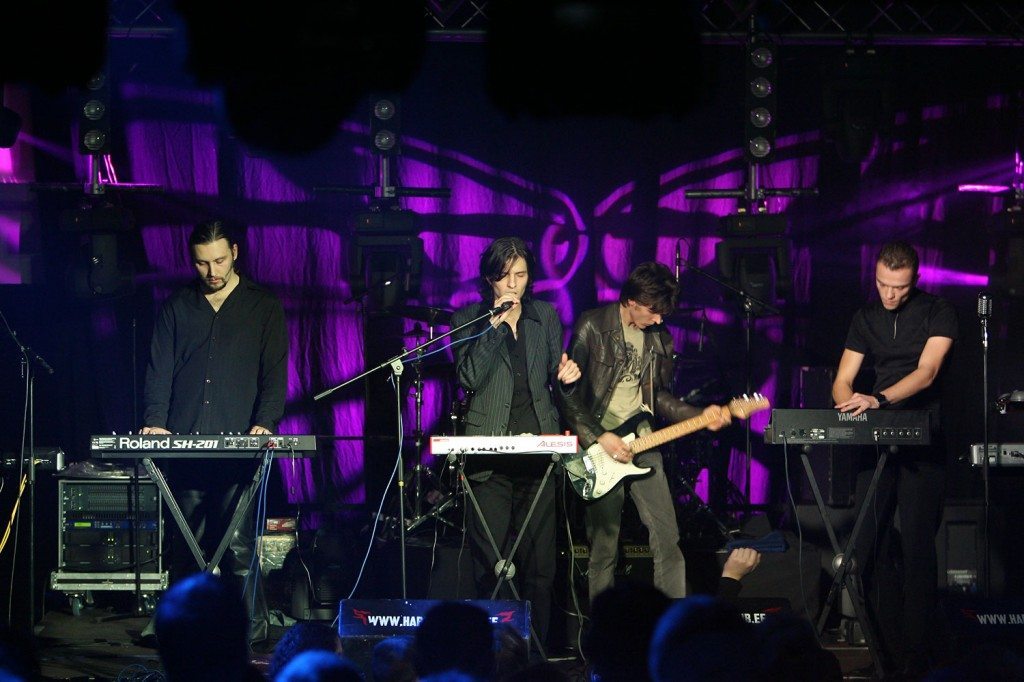In December 2003, Vladislav Belsky joined the band. STandART took the chance to change their sound radically – analog synthesizers, metallic percussion, angry guitars were brought in. Rehearsals were held in a baptist church in Jelgava and in Jūrmala Gymnasium with the sound engineer Kārlis Bardelis.
In January 2004, STandART were guests at the broadcast Radiobumba on the national radio Latvian Radio 1. The band performed acoustic versions of the songs Bezmiegs and Būtībā Man Vienalga (they later became known as Aslan’s Song and Seven Times), using old railway screws, horse-shoes and a tin garbage box from the radio house corridor as percussion.
In March 2004, Kalvis Kluburs started playing synthesizer in live performances of the band Pasaules Gaisma, which had just released their latest (and last) album Matērijas Bilžu Grāmata.
In spring 2004, Kaspars ‘Kņazs’ Stāmers was replaced by Vladislav’s brother Harry, and with this 4 people line-up (Kalvis, Juris, Vladislav, Harry) STandART moved from Jelgava back to the centre of Riga. The first performance of the new lineup took place at One Night With Depeche Mode at Barons, Riga – an event organized by DJ Montuss. Kalvis sang vocals and played two synthesizers, Juris played metallic percussion, guitar, bass guitar, synthesizer, electric drums. Vladislav played bass synthesizer and metallic percussion. Harry played two synthesizers.
At the end of May 2004, STandART video Tālbraucēja Šofera Sapnis (directed by Kalvis Kluburs) won the main award in the contest of LTV1 broadcast Juniors TV. The jury consisted of the directors Pēteris Krilovs, Kristaps Streičs and the cinema critic Daira Āboliņa. This STandART video, just like video Pasaules Gaisma – Matērijas Bilžu Grāmata (director Gatis Pīpkalējs) were named among the best videos of the annual youth video festival 2 Annas, receiving a glass diploma and being released on the festival DVD. STandART video also received the sympathy award of the magazine Sīrups.
In order to participate in the Baltic States youth festival of short films in German language, a new audio version of the song Tālbraucēja Šofera Sapnis was recorded in German – Fernfahrertraum. The video received an extra prize, but was not included in the contest, because its quality was said to be too good and the video had been shown in other places earlier (it was not forbidden in the festival rules). Lyrics in German version were created in collaboration with the German-born poet and translator (and drummer-percussionist) Matthias Knoll residing in Latvia.
The band spent the rest of the year 2004 playing in the clubs of Riga, including a support act for one of the most popular Latvian rock bands Dzelzs Vilks. Both STandART and Pasaules Gaisma participated in a protest action against building works in one of the biggest grey dunes in Europe in Pāvilosta, located on the coast of the Baltic sea. In December 2004, STandART self-released their second single Lielās Atlaides (The Great Absolution), recorded in their home studio Belsky Beat.
In 2005, STandART returned to Jelgava to work again with Gatis Priekulis, the co-producer of the first single. Every song was recorded in two languages – Latvian and English. Fernfahrertraum, as already mentioned, also had a German version. STandART played once more at DM Party at Barons; meanwhile, Fernfahrertraum video for continued to recieve awards and recognition from different video festivals both in Latvia and abroad.
Though Pasaules Gaisma had stopped playing concerts, Kalvis and Juris created a couple of new versions for the old songs. The song Pasaules Gaisma 2005, reworked by Kalvis Kluburs, was included in the compilation Alternative LV – Vol.1 in summer 2005. After that, Kalvis stopped being a part of Pasaules Gaisma.
In autumn 2005, after being one of the band’s driving forces for 2 years, Juris Tipa decided to leave the band, and STandART became a trio. In November 2005, the last concert with Juris Tipa in the lineup was played at Dark Night 2 at the club Depo, sharing the stage with Dzelzs Vilks again and the German industrial rock band The Ancient Gallery from Dresden. The year 2005 was finished with the release of the third maxi-single, the re-recorded Fernfahrertraum 2005 (in Latvian, English and German) and a concert at MicRecBar.
At the beginning of 2006, the new video for the version of Tālbraucēja Šofera Sapnis (Fernfahrertraum) was included in the DVD compilation The Best of Latvia – Vol.1, released by Latvian major label MicRec. STandART started a collaborating with Gatis Gavriļenko as their manager and Sandris Savickis (Overflow) as their new co-producer. Sandris Savickis later became known also as the main member of the bands Starring Two and Padome (both featuring Kalvis Kluburs).
In May 2006, STandART performed at DE/VISION concert afterparty in Riga. In June the band played its first gig at Fontaine Palace, Liepaja. In September 2006, STandART welcomed Juris Tipa back in the lineup. In October, STandART played at Depo together with the Swedish band Lowe and made a remix for the German band Camouflage.
In November 2006, STandART released their 4th maxi-single Corrosion, which featured a couple of new songs, a couple of new videos and – for the first time – several remixes by Latvian and international artists; for example, Hien (Poland), Peter Vanek and Infrabuse (Belgium), former Bitstream member Troubleshooter (UK). The release of the single was followed by a tour across the Baltic States. Finally, STandART were invited to support the legendary German band Camouflage in Tallinn, Estonia (in Riga, STandART played at the Camouflage concert afterparty).
At the end of 2006, the first Latvian music television LMK was founded, which helped STandART videos to get a wider exposure. For the first time, the biggest Latvian alternative radio – Radio NABA – included STandART’s new single in their charts. Subsequently, Corrosion became Christmas No.1 at Radio NABA, spending 6 weeks in total at position No.1.




